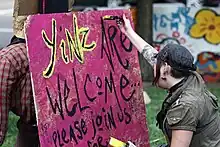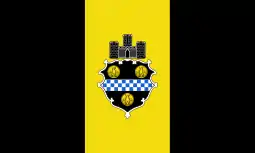
Yinz (see § History and usage below for other spellings) is a second-person plural pronoun used mainly in Western Pennsylvania English, most prominently in Pittsburgh, but it is also found throughout the cultural region known as Appalachia, located within the geographical region of the Appalachians.[1]
History and usage
Yinz is the most recent derivation from the original Scots-Irish form you ones or "yous ones", a form of the second-person plural that is commonly heard in parts of Ulster. In the first- and third-person, standard English speakers use distinct pronouns to denote singular and plural. In the first person, for example, speakers use the singular I and the plural we. However, the second-person pronoun you performs a double duty since it is both the singular form and the plural form. Crozier (1984) suggests that during the 19th century, when many Irish-speakers switched to speaking English, they filled that gap with you ones, primarily because Irish has both the singular second-person pronoun tú and the plural form sibh. The following, therefore, is the most likely path from you ones to yinz: you ones [juː wʌnz] > you'uns [juːʌnz] > youns [juːnz] > yunz [jʌnz] > yinz [jɪ̈nz]. Because there are still speakers who use each form,[2] there is no stable second-person plural pronoun form in the southwest or central Pennsylvania area, so the pronoun is variably referred to or spelled as you'uns, y'ins, y'uns, yunz, yuns, yinz, yenz, yins or ynz.
In other parts of the United States, Irish or Scots-Irish speakers encountered the same gap in the second-person plural. For that reason, these speakers are also responsible for coining the yunz, which is used in and around Middletown, Pennsylvania; the youse, which is found mainly in New York City and Chicago, the Philadelphia dialect and New Jersey; and y'all, which is ubiquitous in the South.[3]
A similar form with similar Irish and Scots roots is found farther north, in the Atlantic Provinces of Canada. Rarely written, it is spelled yous and is usually pronounced as [jɪ̈z] or something between [jɪ̈z] and [jʊ̈z]. It is sometimes combined with all for emphasis, as in "Are yous all coming to the party?" That usage is also common in Australia[4] and within Carbon and Schuylkill Counties, Pennsylvania.
In popular culture
Being one of Pennsylvania's most famous regionalisms makes Yinz a badge of pride. For example, a group of Pittsburgh area radical cheerleaders call themselves "Yinz Cheer", and an area literary magazine was called The New Yinzer, a take-off of The New Yorker. Those perceived to be stereotypical blue collar Pittsburgh residents are often referred to as Yinzers.
Yinztagram is a software program with a Pittsburgh theme.[5]
YinzCam is a Pittsburgh-based software development company.[6]
At the end of every episode of VH-1's Top 20 Countdown, host Jim Shearer always says "I'm Jim Shearer, and I'll see yinz later."
In the TV series One Dollar (2018) set in a rust belt town (shot in and around Pittsburgh), the Yinz address is frequently used.
Waypoint YINZZ in Newell, West Virginia marks the approach to Pittsburgh International Airport.[7]
See also
References
- ↑ Rehder, John B. (2004). Appalachian folkways. Baltimore: Johns Hopkins University Press. ISBN 978-0-8018-7879-4. OCLC 52886851.
- ↑ Peterson, Richard (February 13, 2011). "Is yunz is or is yinz ain't from Pittsburgh?". Pittsburgh Post-Gazette. Archived from the original on September 24, 2015. Retrieved December 20, 2023.
- ↑ Nosowitz, Dan (October 13, 2016). "Y'all, You'uns, Yinz, Youse: How Regional Dialects Are Fixing Standard English: The real enemy? "You guys."". Atlas Obscura. Retrieved August 31, 2018.
- ↑ "Yous". Wiktionary. 31 January 2023.
- ↑ "Yinztagram By Pegula". iTunes Store. Apple Inc. 2012. Retrieved December 13, 2012.
- ↑ Victor, Greg (December 20, 2009). "Next page: Shake things up! 2.0". Pittsburgh Post-Gazette. Archived from the original on January 12, 2014. Retrieved December 20, 2023.
- ↑ "YINZZ waypoint | OpenNav".
Further reading
- Barbara Johnstone and Andrew Danielson, "'Pittsburghese' in the Daily Papers, 1910-1998: Historical Sources of Ideology about Variation", New Ways of Analyzing Variation conference, October 2001.
- Johnstone, B., Bhasin, N., and Wittkowski, D., "Dahntahn" Pittsburgh: Monophthongal /aw/ and representations of localness in Southwestern Pennsylvania. American Speech 77(20):146-166.
- Johnstone, Barbara, Speaking Pittsburghese: The Story of a Dialect. Oxford Studies in Sociolinguistics. Oxford: OUP.
- Crozier, A. (1984). The Scotch-Irish influence on American English. American Speech 59: 310-331.
External links
- Pittsburgh Speech and Society A site for non-linguists, created by Carnegie Mellon University linguist Barbara Johnstone
- Pittsburghese.com (more humorous than scientific)
- What Do You Call a Steeler Fan?
- Are yinz from Pittsburgh?.
- PBS Series, "Do You Speak American?"
- "Philadelphyinz Reps The Burgh with Brotherly Love", Pittsburgh City Paper
